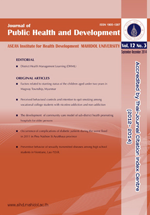Community participation in health care services for type 2 diabetes mellitus patients: A Case Study of A Sub-district Health Promoting Hospital in Northeast Thailand
Main Article Content
Abstract
The main purpose of this action research was to evaluate the effects of Appreciation Influence and Control (AIC) technique in improving knowledge and practices of type 2 diabetes mellitus patients, improving health care services, and active community participation. The research was divided into three phases. First was pre-research phase, researchers studied and descripted of important information, relevance diabetes situation or community context. Second was research phase that brainstorming by A-I-C technique was applied to employ on participants to determine the problems and how to solve the problem including the following 3 steps: 1) presentation of current problems and setting desired goals for future, 2) searching appropriate activities, prioritization of the activities, and job assignment, 3) conducting activity plans and evaluation of the results from the action. Third was summative evaluation phase. The purposive sampling technique was used to select all 71 participants who were willing to participate in the study. A total of 71 participants consisted of type 2 diabetes mellitus patients, patient care givers, village health volunteers, community leaders and health personnel at a Sub-district Health Promoting Hospital (SDHPHs). Qualitative and quantitative methods were used to collect and analyze the data. There were three kinds of instruments used in this study which including questionnaire, discussion guidelines, and observation checklist for investigation of the change on knowledge, patients’ practices, and community members’ participation. All three instruments were approved for content validity by the three experts. The questionnaire was analyzed a reliability by Cronbach’s alpha coefficient was 0.79. Inferential statistic like paired t-test was utilized to compare the difference between the diabetes mellitus patients’ knowledge and practices before and after the development. In addition, content analysis was applied to present the qualitative data by compiling keywords and relating reasonableness.
Results revealed that, both diabetes knowledge and practices of type 2 diabetes mellitus patients have a significant difference between before and after the AIC technique approach. The effects of Appreciation Influence Control (AIC) technique led the gathering participants perceived and was aware of their diabetes problems. They have the opportunity to express their views and making developing activities for improving in health care services for type 2 diabetes mellitus patients. They participated improving health care services according to their perspectives and having satisfaction in their cooperating outcomes.
Conclusion, AIC technique gathered the people concerned diabetes problem to situation analysis, decision-making, planning, and programme implementation. It was appropriate tool for development of community participation to improving health care services for type 2 diabetes mellitus patients.


